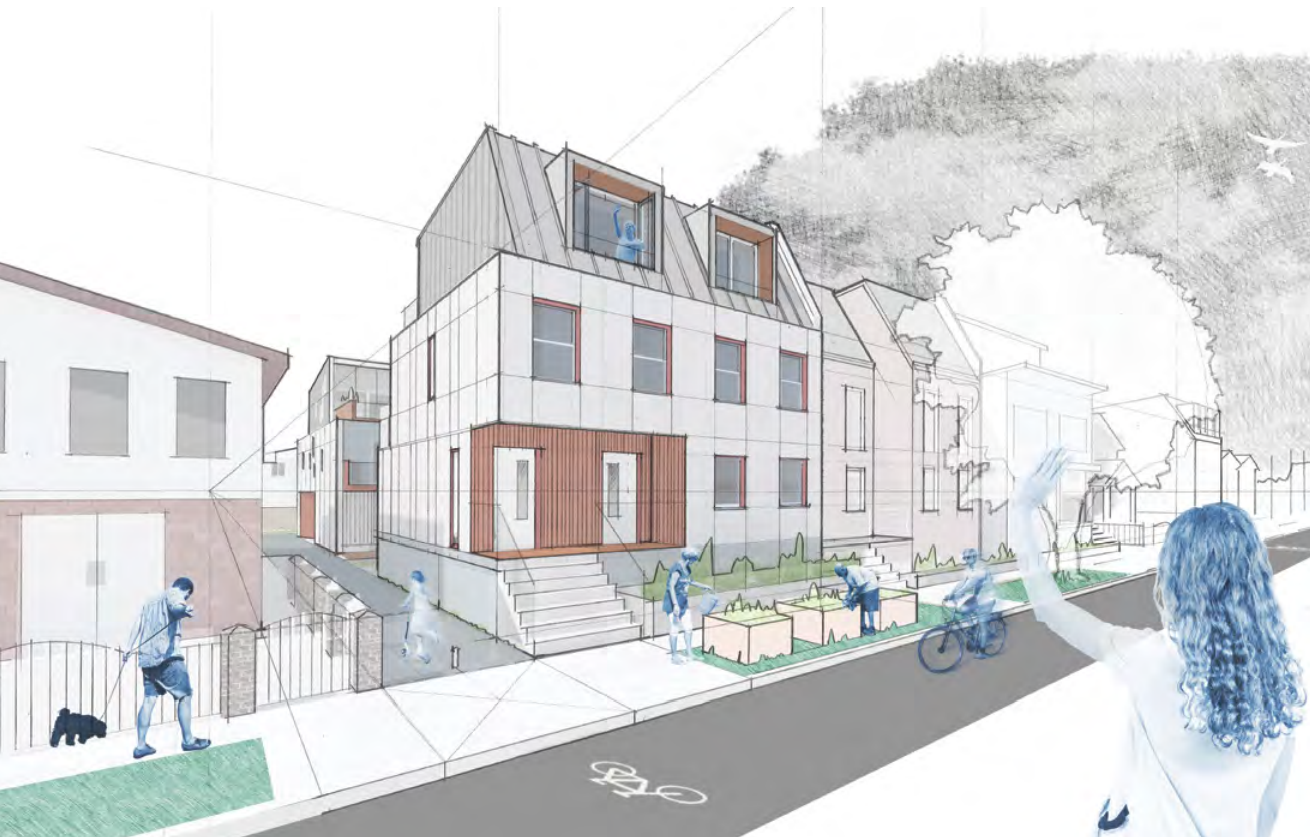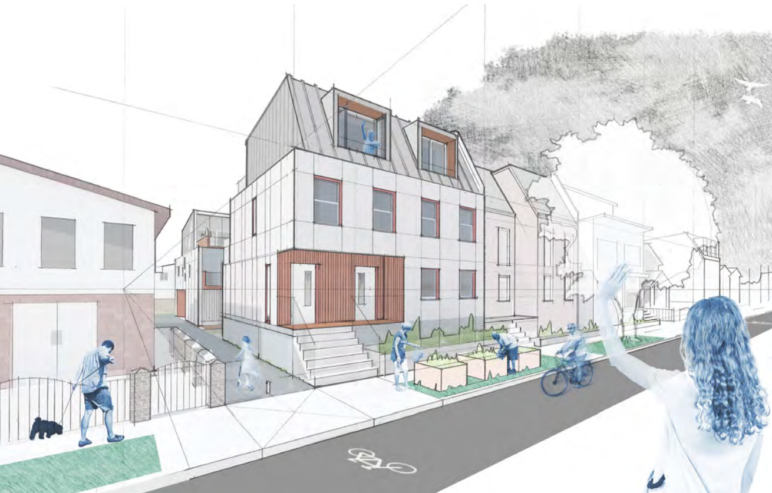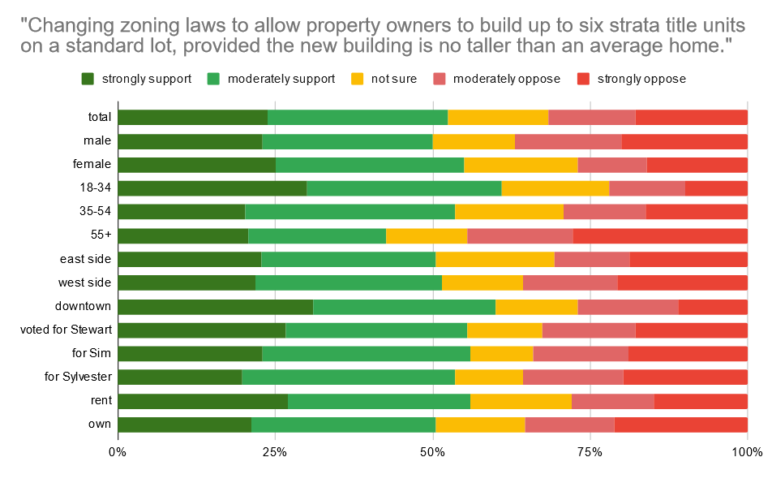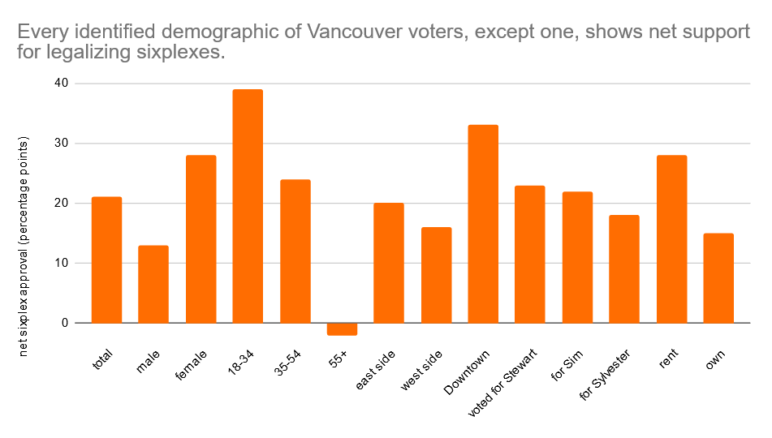Slam another nail into the coffin of the notion that it’s politically unthinkable to lift bans on small attached homes.
In a Vancouver, BC, poll released last week, a majority of likely voters endorsed citywide sixplex legalization, with 16 percent undecided. Supporters outnumbered opponents by a 21-point margin, far beyond the 4.9 percent margin of error.
In fact, supporters significantly outnumbered opponents among men, women, east-siders, west-siders, downtowners, tenants, homeowners, likely voters aged 18-34, likely voters aged 35-54, and supporters of all three leading candidates in the last mayoral election.
Only one demographic emerged as narrowly opposed to the notion: Vancouverites over age 55.
All told, the proposal had 53 percent support among likely voters and 32 percent opposition, with the rest unsure.
That’s similar to the 48/29 split on a similar question in Seattle in 2017.
This month’s independent poll by Vancouver-based Research Co. was not associated with Mayor Kennedy Stewart, who brought a similar pilot proposal before Vancouver’s city council last month. That proposal, which Stewart’s office had developed internally with input from several community groups, died at council but could remain an issue for the city’s 2022 election cycle. (Who knows? If British Columbia’s incoming legislature were to follow the southern examples of Oregon, California, Washington, Vermont, Nebraska, Maryland, Virginia, and Minnesota, it could even become a provincial issue.)
The poll did stipulate that buildings on six-unit lots would not be allowed to be taller than an “average home.” As Minneapolis discovered this year, that standard would make it financially infeasible for many plexes to actually get built, though the city would have other options: making driveways optional and allowing buildings to cover more of their lots.
That lines up with the conclusions of a report this fall from Urbanarium. It was bursting with design ideas and policy tweaks that could re-legalize so-called “missing middle” housing options in Vancouver. One proposal was to let new buildings in low-density areas be slightly taller than the current 35 feet, but to make them look less boxy by requiring front roof lines to slope backwards from 30 feet.
Urbanarium also commissioned this terrific short video by local filmmakers About Here. It explains how cities like Vancouver banned smallplexes, what that caused and what can be done about it:
Even more people might like the concept if it also included price-controlled homes
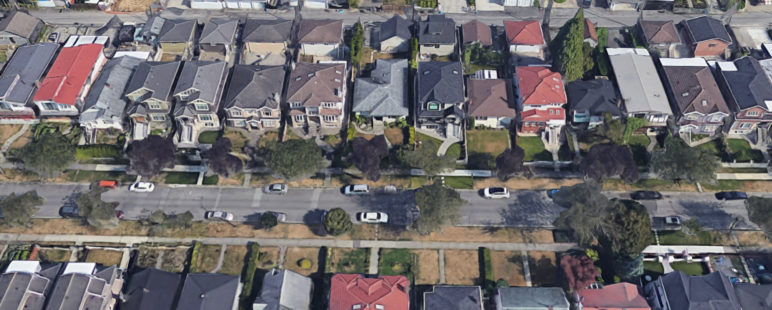
Low-density and high-density zoning, with little in between, has brought out the worst in markets by channeling private investment into the two most expensive housing types. Image: Google Maps.
Though the six-home concept is popular, it is also controversial. Almost one in five Vancouverites, and 28 percent of Vancouverites over 55, said they “strongly oppose” it.
However, it’s also just a concept, and it’s possible that a slightly more fleshed-out proposal would be even more popular. In Portland, which legalized market-rate fourplexes and mixed-income sixplexes in August, including that additional option to help create below-market homes anywhere for less subsidy turned out to be the key to passing a longstanding fourplex legalization proposal.
The Research Co. poll didn’t mention the possibility of requiring some of the newly created homes to be sold for less than market rate, as Stewart proposed. Another option would be to follow Portland’s pattern, upzoning a bit for market-rate plexes and much more for mixed-income projects.
Another thing the simple poll question couldn’t capture: Every year that goes by without zoning reform is changing Vancouver, too. By continuing to ban lower-cost housing types from 57 percent of Vancouver, the city does nothing at all to prevent the market price of the existing detached homes in those areas from going up and up and up.
That may seem good for the minority of Vancouverites who are lucky enough to own a market-rate oneplex.
But as this poll suggests, even many of those homeowners seem to feel that the city’s bans on small attached homes are slowly turning Vancouver into a city they like less.

